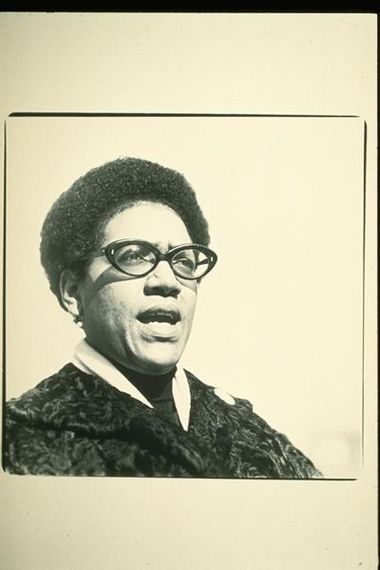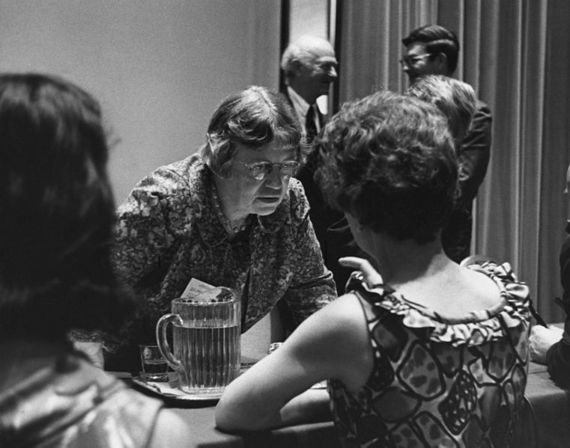The cultural anthropologist Margaret Mead, who died in 1978 but would have have turned 113 on Tuesday is a bit of a hero of mine. I like strong, smart woman in sensible shoes. So, I looked up some of her writings and found this: "Every time we liberate a woman, we liberate a man."
That seemed an apt impetus to say a word of thanks as a gay man to my lesbian and bisexual sisters.
Gay and bisexual men and women owe a special allegiance to one another and gay men have much to cherish and give thanks for to the women in our lives, and specifically to lesbian and bisexual women. We can rightly be thought of as chosen brothers and sisters who are healthier and happier in mind, body and spirit for being in one another's lives.
Most people begin their journey as someone who will eventually come to identify as transgender, bisexual, lesbian or gay essentially alone, going through a process that moves from unconscious to conscious, unnamed to named, anxious to confident, individual to community-aligned and "in the closet" to out and, hopefully, proud. Along the way, there is often much confusion, fear, loneliness, self-doubt and concern about how the people in their lives will relate to them if they choose to assert an identity as gender-different in some way.
There are few among us in the LGBT community who did not feel a warm sense of relief and joy at making those first welcomed connections with others who shared our special experiences of identity and identification. Often those connections, whether found online, in a bar, in a sexual context or among the already well-established environments of our lives, while vitally important to our growing sense of ourselves and our comfort as part of newfound circles, not infrequently came with some increased anxieties. These new alliances, all the better in some ways when made with those very much like ourselves, could be complicated by worries about negotiating the possibility of sexual or romantic attraction or rejection.
What a relief to find supportive friends where things weren't necessarily so fraught. While being an LGBT person is usually thought of as intrinsically focused on sex, sexuality and, now, marriage, for most of us I'd wager, central strengths and satisfactions have been found among those we call friends.
As a Feminist, (hell, yes, capitalized!), I have come to understand transphobia and homophobia as extensions of sexism, given that it is much more frequently the violations of gender norms that elicit social sanctions and prejudice as opposed to private and consensual intimacies. It has always dismayed me to see sexist attitudes expressed within our own community. Just one special type of sexism can sometimes be found in gay men's rejection of the sense of fellow feeling to be found in friendship with lesbian and bisexual women.
I consider myself lucky to have always been seemingly instinctively drawn to friendships with gay women. When I began college at a small Catholic institution in Pennsylvania surrounded by cornfields, my strongest sense of safety, intellectual affinity and social warmth was with lesbians, often a few years older than I, who took me under their wing and acted as mentors and friends who showed special sensitivity and care to me as a person and as a gay man.
During the darkest days of the AIDS Crisis in New York City in my twenties, I found myself profoundly moved and heartened by the women, not infrequently lesbians and bisexuals, who joined the ranks of ACT-UP and other advocacy and service groups whose leadership, compassion and fierce commitment inspired and sustained those of us who were fighting for our lives. These remarkable and strong women defined for me what it was to be an ally, an activist, an educator, a healer and a true friend.
Women, of course, have borne a heavy burden of impact and losses from HIV themselves, complicated by relationship violence, prejudice and inequalities in access to health care and lack of attention to the different ways that illness attacks and progresses in their bodies. The increased energies given in recent years to the issue of cancer and other illnesses among lesbian and gay women has been long overdue, along with similar disparities and dangers that impact the health and well-being of transgender people.
One day recently in the Human Behavior class I teach at the Silberman School of Social Work at Hunter College in Manhattan, one of my students, in her early twenties, led a presentation on a journal article about gender and difference. In describing gender as a continuum, she used herself as an example with brightly-colored stars popping up on the PowerPoint presentation over where she personally identified on the monochromatic arrowed lines that represented the binaries of male and female, gay and straight, transgender and cisgender. The student demonstrated a powerfully appropriate and brave professional use of self to make the theoretical personal, and then political as she gave an informed critiqued of the journal article, finally leading the class in a discussion of issues and implications that sparkled with insight and seriousness as well empathy and humor.
Then I couldn't help thinking of another hero of mine, the Caribbean-American lesbian writer and activist Audre Lorde who once said "The sharing of joy, whether physical, emotional, psychic or intellectual, forms a bridge between the sharers which can be the basis for understanding much of what is not shared between them, and lessens the threat of their difference."
Shared joys heal and sustain. They are a uniquely special form of education. Lesbian and bisexual women, transgender and cisgender, have been profound teachers in my life of what it is to be truly alive, truly healthy and truly a friend.
So thanks, Margaret, thanks Audre, thanks to my student, and thank goodness for strong, smart women in sensible shoes.

